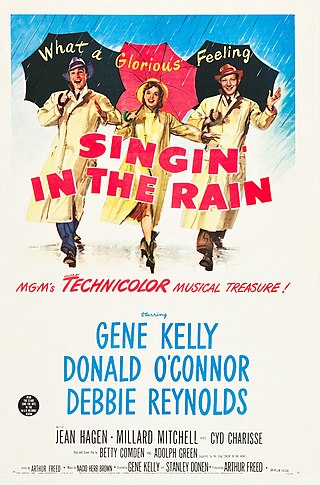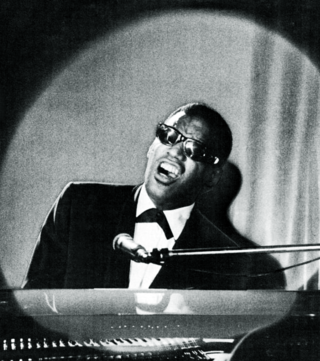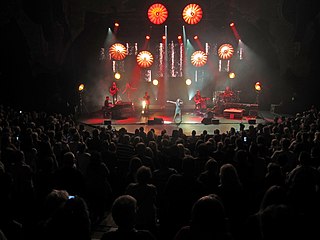Related Research Articles

Funk is a music genre that originated in African American communities in the mid-1960s when musicians created a rhythmic, danceable new form of music through a mixture of various music genres that were popular among African-Americans in the mid-20th century. It deemphasizes melody and chord progressions and focuses on a strong rhythmic groove of a bassline played by an electric bassist and a drum part played by a percussionist, often at slower tempos than other popular music. Funk typically consists of a complex percussive groove with rhythm instruments playing interlocking grooves that create a "hypnotic" and "danceable" feel. It uses the same richly colored extended chords found in bebop jazz, such as minor chords with added sevenths and elevenths, and dominant seventh chords with altered ninths and thirteenths.

Musical film is a film genre in which songs by the characters are interwoven into the narrative, sometimes accompanied by dancing. The songs usually advance the plot or develop the film's characters, but in some cases, they serve merely as breaks in the storyline, often as elaborate "production numbers".
Rock is a broad genre of popular music that originated as "rock and roll" in the United States in the late 1940s and early 1950s, developing into a range of different styles from the mid-1960s, particularly in the United States and the United Kingdom. It has its roots in 1940s and 1950s rock and roll, a style that drew directly from the blues and rhythm and blues genres of African-American music and from country music. Rock also drew strongly from genres such as electric blues and folk, and incorporated influences from jazz, classical, and other musical styles. For instrumentation, rock has centered on the electric guitar, usually as part of a rock group with electric bass guitar, drums, and one or more singers. Usually, rock is song-based music with a 4
4 time signature using a verse–chorus form, but the genre has become extremely diverse. Like pop music, lyrics often stress romantic love but also address a wide variety of other themes that are frequently social or political. Rock was the most popular genre of music in the U.S. and much of the Western world from the 1950s to the 2010s.

The 1970s was a decade that began on January 1, 1970, and ended on December 31, 1979.

Soul music is a popular music genre that originated in the African American community throughout the United States in the late 1950s and early 1960s. It has its roots in African-American gospel music and rhythm and blues. Soul music became popular for dancing and listening, where U.S. record labels such as Motown, Atlantic and Stax were influential during the Civil Rights Movement. Soul also became popular around the world, directly influencing rock music and the music of Africa. It also had a resurgence with artists like Erykah Badu under the genre neo-soul.
A roots revival is a trend which includes young performers popularizing the traditional musical styles of their ancestors. Often, roots revivals include an addition of newly composed songs with socially and politically aware lyrics, as well as a general modernization of the folk sound.

Schlager music is a style of European popular music that is generally a catchy instrumental accompaniment to vocal pieces of pop music with simple, happy-go-lucky, and often sentimental lyrics.
The music of the Philippines includes the musical performance arts in the Philippines and the music of Filipinos composed in various local and international genres and styles. Philippine musical compositions are often a mixture of indigenous styles, and various Asian styles, as well as Spanish/Latin American and (US) American influences through foreign rule from those countries.

Doner kebab, also spelled as döner kebab, is a dish of Turkish origin made of meat cooked on a vertical rotisserie. Seasoned meat stacked in the shape of an inverted cone is turned slowly on the rotisserie, next to a vertical cooking element. The operator uses a knife to slice thin shavings from the outer layer of the meat as it cooks. The vertical rotisserie was invented in the 19th-century Ottoman Empire, and dishes such as the Arab shawarma, Greek gyros, Canadian donair, and Mexican al pastor are derived from this.
Zamrock is a musical genre that emerged and gained popularity in Zambia during the early 1970s. It has been described as a fusion of traditional African music and psychedelic rock, garage rock, hard rock, blues and funk, taking influence from popular bands like Black Sabbath, Blue Cheer, the Rolling Stones, Deep Purple, and Cream.
Classic hits is a radio format which generally includes songs from the top 40 music charts from the late 1960s to the early 2000s, with music from the 1980s serving as the core of the format. Music that was popularized by MTV in the early 1980s and the nostalgia behind it is a major driver to the format. It is considered the successor to the oldies format, a collection of top 40 songs from the late 1950s through the late 1970s that was once extremely popular in the United States and Canada. The term is sometimes incorrectly used as a synonym for the adult hits format, which uses a slightly newer music library stretching from all decades to the present with a major focus on 1990s and 2000s pop, rock and alternative songs. In addition, adult hits stations tend to have larger playlists, playing a given song only a few times per week, compared to the tighter libraries on classic hits stations. For example, KRTH, a classic hits station in Los Angeles, and KSPF, a classic hits station in Dallas, both play power songs up to 30 times a week or more, which is another differentiator compared to other formats that share songs with classic hits libraries.
Eurodisco is the variety of European forms of electronic dance music that evolved from disco in the late 1970s, incorporating elements of pop and rock into a disco-like continuous dance atmosphere. Many Eurodisco compositions feature lyrics sung in English, although the singers often share a different mother tongue.

American popular music has had a profound effect on music across the world. The country has seen the rise of popular styles that have had a significant influence on global culture, including ragtime, blues, jazz, swing, rock, bluegrass, country, R&B, doo wop, gospel, soul, funk, punk, disco, house, techno, salsa, grunge and hip hop. In addition, the American music industry is quite diverse, supporting a number of regional styles such as zydeco, klezmer and slack-key.
Mbalax is the national popular dance music of Senegal and the Gambia. In the 1970s, mbalax emerged as the distinctive sound of postcolonial Senegal. Derived from a fusion of indigenous Wolof sabar drumming with popular music principally from the African diaspora and African popular music, and to a lesser extent Western pop and afropop. Although the fusion of indigenous music with urban dance music from the diaspora and west is not new, the pan-ethnic quality of urban Wolofness provided a space for the inclusion and representation of a plethora of ethnic sounds of the Pulaar/Tukulor, Sereer, Soce, Mande and other groups from the Greater Senegambia Region. The name mbalax derives from the accompanying rhythms of the Wolof sabar and was coined by Youssou N'Dour even though, as he has stated, there were many other groups in urban Senegal fusing these traditional sounds with modern music.

Dance music is music composed specifically to facilitate or accompany dancing. It can be either a whole piece or part of a larger musical arrangement. In terms of performance, the major categories are live dance music and recorded dance music. While there exist attestations of the combination of dance and music in ancient times, the earliest Western dance music that we can still reproduce with a degree of certainty are old-fashioned dances. In the Baroque period, the major dance styles were noble court dances. In the classical music era, the minuet was frequently used as a third movement, although in this context it would not accompany any dancing. The waltz also arose later in the classical era. Both remained part of the romantic music period, which also saw the rise of various other nationalistic dance forms like the barcarolle, mazurka, ecossaise, ballade and polonaise.
This article includes an overview of the major events and trends in popular music in the 1970s.

Andrew is the English form of the given name, common in many countries. The word is derived from the Greek: Ἀνδρέας, Andreas, itself related to Ancient Greek: ἀνήρ/ἀνδρός aner/andros, "man", thus meaning "manly" and, as consequence, "brave", "strong", "courageous", and "warrior". In the King James Bible, the Greek "Ἀνδρέας" is translated as Andrew.

Christgau's Record Guide: Rock Albums of the Seventies is a music reference book by American music journalist and essayist Robert Christgau. It was first published in October 1981 by Ticknor & Fields. The book compiles approximately 3,000 of Christgau's capsule album reviews, most of which were originally written for his "Consumer Guide" column in The Village Voice throughout the 1970s. The entries feature annotated details about each record's release and cover a variety of genres related to rock music.